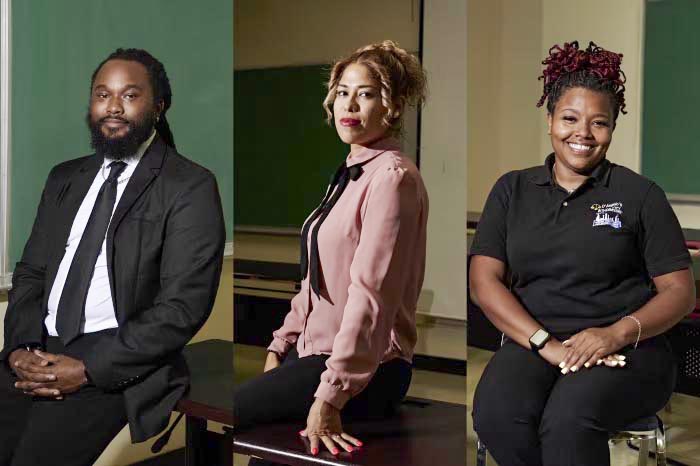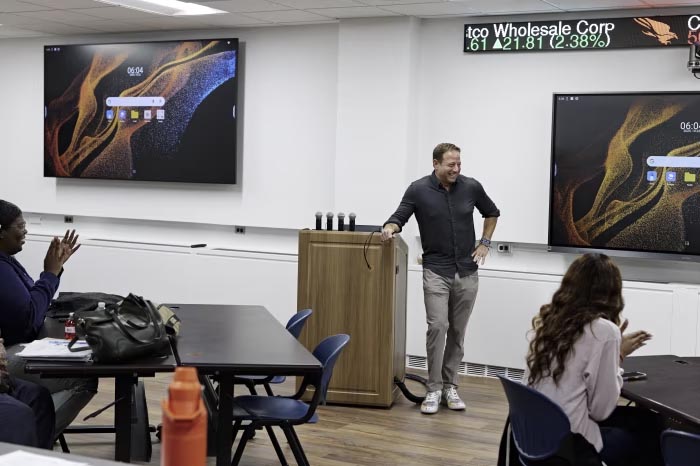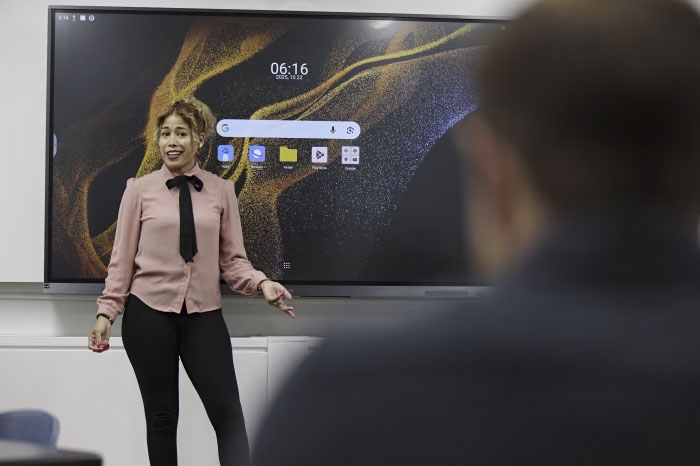The Chicago Students Learning How to Get Very, Very Rich
At Chicago State, group of students bypassing practical tips on job hunting in favor of lessons on building significant wealth.
By Jeanne Whalen

Raymond Turner, Angelica Tapia and Angel Ingram are all students in Pete Kadens’s
class at Chicago State University.
Photo Credit: Mustafa Hussain for WSJ
CHICAGO—Growing up in a low-income household on Chicago’s South Side, Jenae Crockett earned good grades and a partial scholarship to college. But she was forced to drop out when she realized she couldn’t afford it.
Now 34-years-old and enrolled in a wealth-building class at Chicago State University, Crockett is setting much grander goals: starting a company and building a net worth of $25 million by 2036.
“I do want to be a millionaire. I used to think honestly before this class that it was selfish to say something like that,” said Crockett, an accounting major who makes around $45,000 a year doing billing for a home-healthcare agency. “I want to leave a legacy, and I need resources to do that.”
Crockett and most of her classmates are aiming for fortunes of tens of millions—enough to secure their descendants, fund charitable projects and, in one student’s case, to buy vacation homes in New Orleans and Playa del Carmen.
The person helping them get there is Pete Kadens, a wealthy white entrepreneur teaching the mostly Black CSU classroom strategies on getting very rich. Kadens’s pitch to the 33 students taking his weekly “Mastering Wealth” class: Affluence isn’t just for privileged people, but for anyone willing to take big risks and work like a demon.

Jenae Crockett is seeking to start a company and build a net worth of $25 million
by 2036
Photo Credit: Mustafa Hussain for WSJ

Pete Kadens teaching at Chicago State University last month.
Photo Credit: Mustafa Hussain for WSJ
Having the “balls and the guts to say ‘I’m going to make $50 million by the time I’m 35 years old’…that is not typically reserved for Black and brown students in this country,” says Kadens, who is worth roughly $250 million after founding companies in the solar and cannabis industries. “That’s typically reserved for rich white kids that come from Greenwich.”
Kadens, who grew up in Toledo, Ohio, before moving to Chicago, is tapping into what CSU President Z Scott calls students’ growing interest in self-made affluence, fueled partly by social media.
“A typical route for a graduate with a college education is into an environment where you are working 9 to 5, building skills and moving up the ladder,” she said. But there is a category of students looking to move away from traditional corporate paths and “thinking about ‘What’s my hustle?’ right? ‘What kind of business am I going to create?’” Scott said.
If even a handful of the students make the leap to riches, it could make a difference for the struggling communities they come from, said Kadens, who has also co-founded charities that have financed college educations for more than 2,000 students from Chicago and Toledo.
“When people are crazy successful and crazy wealthy in underserved communities, the blast radius is big, and that’s what we’re looking for,” Kadens said.
There are obstacles to the Chicago experiment. Some students’ attendance and punctuality are spotty. Few in the classroom have access to investment capital. Many are working one or more jobs and worrying about affording housing, daycare and groceries.

The Chicago State University campus.
Photo Credit: Mustafa Hussain for WSJ
Still, a number of students are eager to try. Raymond Turner, a 29-year-old who grew up in public housing, aims to build a vertically integrated cannabis company and a real-estate empire that will repair run-down houses for rent or sale. His goal: net worth of $27 million by age 45.
Turner works a day job as a manager in a warehouse and has a side business selling a type of rolling paper that he patented. The Kadens class, he said, has shown him “how feasible it is to become rich if you focus on becoming rich…this has given me at least a loose road map.”
Angelica Tapia currently cleans houses for a living, through a company she founded. She also works as a tax preparer for a big company. Her goal is to build a net worth of $3 million within 10 years by expanding her cleaning business and starting her own tax-prep venture. As a first step, she wants to hire more cleaners to work with her, and then eventually aims to franchise that business.
“I don’t like to work for someone else all the time when I know I can do it,” said Tapia, who said she showed a knack for numbers as a young girl by helping her grandmother ring up customers at a convenience store in Mexico. “It’s more responsibility when you are your own boss,” she added, “but the payoff is more than if you are just working 40 hours and that is it.”
Classes have focused on setting concrete wealth goals and identifying consumer “pain points” that a startup could fix. After pitching their best ideas—an automated pothole-repair machine, a wearable air purifier for people with allergies—the students coalesced around a winner: a self-inflating-tire product. Then Tapia and fellow student Angel Ingram led them through the development of a business plan with a $4 million budget.

Angelica Tapia aims to expand her cleaning business and start her own tax-prep venture.
Photo Credit: Mustafa Hussain for WSJ
During another class, Kadens handed out $100 bills to students who volunteered to stand and describe how they planned to multiply their current incomes by 10. He also passed around a risk-tolerance quiz and chided students who proved risk-averse. “If you want to be Jay-Z rich…that’s not going to work,” he said.
A visiting cast of millionaires and billionaires—friends of Kadens’s from around the country—have dropped by to share tips.
Shegun Otulana, a software entrepreneur who didn’t know anyone when he moved to Alabama from Nigeria as a college student, spoke about founding a company that he eventually sold for $1.25 billion. He emphasized the importance of riding new waves of technology or societal change, noting that his software products for therapists benefited from the rapid spread of therapy.
Last week, Kadens handed out cash awards to students who submitted the best wealth-creation plans. When Bryanna Williams heard she won first place and $5,000, she broke into tears.
Her written plan describes her path to achieving net worth of $10 million by 2035 through an aromatherapy business, a counseling practice, real-estate investments and publishing. Williams also details her robust philanthropic goals, including mentoring other Black entrepreneurs.
“This is a vision of being completely in bliss,” she concludes, “fully engulfed in the American dream I have created for myself.”

 All Rights Reserved
All Rights Reserved